- Home
- Emile Gaboriau
Baron Trigault's Vengeance Page 3
Baron Trigault's Vengeance Read online
Page 3
III.
It was as if he had seen an apparition, and he was vainly striving todrive away a terrible, mysterious fear, when a heavy footfall madethe floor of the dining-room creak anew. The noise restored him toconsciousness of his position. "It is the baron!" he thought; "he iscoming this way! If he finds me here I am lost; he will never consent tohelp me. A man would never forgive another man for hearing what I havejust heard."
Why should he not try to make his escape? The card, bearing the nameof Maumejan, would be no proof of his visit. He could see the baronsomewhere else some other day--elsewhere than at his own house, so thathe need not fear the recognition of the servants. These thoughts flashedthrough his mind, and he was about to fly, when a harsh cry held himspell-bound. Baron Trigault was standing on the threshold. His emotion,as is almost always the case with corpulent people, was evinced by afrightful distortion of his features. His face was transformed, hislips had become perfectly white, and his eyes seemed to be starting fromtheir sockets. "How came you here?" he asked, in a husky voice.
"Your servants ushered me into this room."
"Who are you?"
"What! monsieur, don't you recognize me?" rejoined Pascal, who in hisagitation forgot that the baron had seen him only twice before. Heforgot the absence of his beard, his almost ragged clothing, and all theprecautions he had taken to render recognition impossible.
"I have never met any person named Maumejan," said the baron.
"Ah! monsieur, that's not my name. Have you forgotten the innocent manwho was caught in that infamous snare set for him by the Viscount deCoralth?"
"Yes, yes," replied the baron, "I remember you now." And thenrecollecting the terrible scene that had just taken place in theadjoining room: "How long have you been here?" he asked.
Should Pascal tell a falsehood, or confess the truth? He hesitated, buthis hesitation lasted scarcely the tenth part of a second. "I have beenhere about half an hour," he replied.
The baron's livid cheeks suddenly became purple, his eyes glittered, andit seemed by his threatening gesture as if he were strongly tempted tomurder this man, who had discovered the terrible, disgraceful secretsof his domestic life. But it was a mere flash of energy. The terribleordeal which he had just passed through had exhausted him mentally andphysically, and it was in a faltering voice that he resumed: "Then youhave not lost a word--a word of what was said in the other room?"
"Not a word."
The baron sank on to the divan. "So the knowledge of my disgrace isno longer confined to myself!" he exclaimed. "A stranger's eye haspenetrated the depths of misery I have fallen into! The secret of mywretchedness and shame is mine no longer!"
"Oh, monsieur, monsieur!" interrupted Pascal. "Before I recross thethreshold of your home, all shall have been forgotten. I swear it by allthat is most sacred!"
He had raised his hand as if to take a solemn oath, when the baroncaught hold of it, and, pressing it with sorrowful gratitude, exclaimed:"I believe you! You are a man of honor--I only needed to see your hometo be convinced of that. You will not laugh at my misfortunes or mymisery!" He must have been suffering frightfully, for big tears rolledslowly down his cheeks. "What have I done, my God! that I should beso cruelly punished?" he continued. "I have always been generous andcharitable, and ready to help all who applied to me. I am utterly alone!I have a wife and a daughter--but they hate me. They long for my death,which would give them possession of my wealth. What torture! For monthstogether I dared not eat a morsel of food, either in my own house, orin the house of my son-in-law. I feared poison; and I never partook of adish until I had seen my daughter or my wife do so. To prevent a crime,I was obliged to resort to the strangest expedients. I made a will, andleft my property in such a way that if I die, my family will not receiveone penny. So, they now have an interest in prolonging my life." As hespoke he sprang up with an almost frenzied air, and, seizing Pascal bythe arm, again continued. "Nor is this all! This woman--my wife--youknow--you have heard the extent of her shame and degradation. Ah, well!I--love her!"
Pascal recoiled with an exclamation of mingled horror and consternation.
"This amazes you, eh?" rejoined the baron. "It is indeedincomprehensible, monstrous--but it is the truth. It is to gratify herdesire for luxury that I have toiled to amass millions. If I purchaseda title, which is absurd and ridiculous, it was only because I wishedto satisfy her vanity. Do what she may, I can only see in her the chasteand beautiful wife of our early married life. It is cowardly, absurd,ridiculous--I realize it; but my love is stronger than my reason or mywill. I love her madly, passionately; I cannot tear her from my heart!"
So speaking, he sank sobbing on to the divan again. Was this, indeed,the frivolous and jovial Baron Trigault whom Pascal had seen at Madamed'Argeles's house--the man of self-satisfied mien and superb assurance,the good-natured cynic, the frequenter of gambling-dens? Alas, yes! Butthe baron whom the world knew was only a comedian; this was the realman.
After a little while he succeeded in controlling his emotion, and in acomparatively calm voice he exclaimed: "But it is useless to distractone's mind with an incurable evil. Let us speak of yourself, M.Ferailleur. To what do I owe the honor of this visit?"
"To your own kind offer, monsieur, and the hope that you will help me inrefuting this slander, and wreaking vengeance upon those who have ruinedme."
"Oh! yes, I will help you in that to the full extent of my power,"exclaimed the baron. But experience reminded him that confidentialdisclosures ought not to be made with the doors open, so he rose, shutthem, and returning to Pascal, said: "Explain in what way I can be ofservice to you, monsieur."
It was not without many misgivings that Pascal had presented himselfat the baron's house, but after what he had heard he felt no furtherhesitation; he could speak with perfect freedom. "It is quiteunnecessary for me to tell you, Monsieur le Baron," he began, "that thecards which made me win were inserted in the pack by M. de Coralth--thatis proven beyond question, and whatever the consequences may be, I shallhave my revenge. But before striking him, I wish to reach the man whoseinstrument he was."
"What! you suppose----"
"I don't suppose--I am sure that M. de Coralth acted in obedience to theinstructions of some other scoundrel whose courage does not equal hismeanness."
"Perhaps so! I think he would shrink from nothing in the way ofrascality. But who could have employed him in this vile work ofdishonoring an honest man?"
"The Marquis de Valorsay."
On hearing this name, the baron bounded to his feet. "Impossible!" heexclaimed; "absolutely impossible! M. de Valorsay is incapable of thevillainy you ascribe to him. What do I say?--he is even above suspicion.I have known him for years, and I have never met a more loyal, morehonorable, or more courageous man. He is one of my few trusted friends;we see each other almost every day. I am expecting a visit from him evennow."
"Still it was he who incited M. de Coralth to do the deed."
"But why? What could have been his object?"
"To win a young girl whom I love. She--loved me, and he saw that Iwas an obstacle. He put me out of the way more surely than if he hadmurdered me. If I died, she might mourn for me--dishonored, she wouldspurn me----"
"Is Valorsay so madly in love with the girl, then?"
"I think he cares but very little for her."
"Then why----"
"She is the heiress of several millions."
It was evident that this explanation did not shake Baron Trigault'sfaith in his friend. "But the marquis has an income of a hundredand fifty or two hundred thousand francs," said he; "that is anall-sufficient justification. With his fortune and his name, he is in aposition to choose his wife from among all the heiresses of France. Whyshould he address his attentions in particular to the woman you love?Ah! if he were poor--if his fortune were impaired--if he felt the needof regilding his escutcheon, like my son-in-law----"
He paused; there was a rap at the door. The baron called out: "Comein," and a valet appe
ared, and informed his master that the Marquis deValorsay wished to speak with him.
It was the enemy! Pascal's features were distorted with rage; but he didnot stir--he did not utter a word. "Ask the marquis into the next room,"said the baron. "I will join him there at once." Then as the servantretired, the baron turned to Pascal and said: "Well, M. Ferailleur, doyou divine my intentions?"
"I think so, monsieur. You probably intend me to hear the conversationyou are going to have with M. de Valorsay."
"Exactly. I shall leave the door open, and you can listen."
This word, "listen," was uttered without bitterness, or even reproach;and yet Pascal could not help blushing and hanging his head. "I wish toprove to you that your suspicions are without foundation," pursuedthe baron. "Rest assured that I shall prove this conclusively. I willconduct the conversation in the form of a cross-examination, and afterthe marquis's departure, you will be obliged to confess that you werewrong."
"Or you, that I am right?"
"So be it. Any one is liable to be mistaken, and I am not obstinate."
He was about to leave the room, when Pascal detained him. "I scarcelyknow how to testify my gratitude even now, monsieur, and yet--if Idared--if I did not fear to abuse your kindness, I should ask one morefavor."
"Speak, Monsieur Ferailleur."
"It is this, I do not know the Marquis de Valorsay; and if, instead ofleaving the door wide open, you would partially close it, I should hearas distinctly, and I could also see him."
"Agreed," replied the baron. And, opening the door, he passed into thedining-room, with his right hand cordially extended, and saying, in hismost genial tones: "Excuse me, my dear friend, for keeping you waiting.I received your letter this morning, and I was expecting you, but someunexpected business required my attention just now. Are you quite well?"
As the baron entered the room, the marquis had stepped quickly forwardto meet him. Either he was inspired with fresh hope, or else hehad wonderful powers of self-control, for never had he looked morecalm--never had his face evinced haughtier indifference, more completesatisfaction with himself, and greater contempt for others. He wasdressed with even more than usual care, and in perfect taste as well;moreover, his valet had surpassed himself in dressing his hair--for onewould have sworn that his locks were still luxuriant. If he experiencedany secret anxiety, it only showed itself in a slightly increasedstiffness of his right leg--the limb broken in hunting. "I ought ratherto inquire concerning your own health," he remarked. "You seem greatlydisturbed; your cravat is untied." And, pointing to the broken chinascattered about the floor, he added: "On seeing this, I asked myself ifan accident had not happened."
"The baroness was taken suddenly ill at the breakfast table. Herfainting fit startled me a little. But it was a mere trifle. She hasquite recovered already, and you may rely upon her applauding yourvictory at Vincennes to-day. She has I don't know how many hundred louisstaked upon your horses."
The marquis's countenance assumed an expression of cordial regret. "I amvery sorry, upon my word!" he exclaimed. "But I sha'n't take part in theraces at Vincennes. I have withdrawn my horses. And, in future, I shallhave nothing to do with racing."
"Nonsense!"
"It is the truth, however. I have been led to this determination by theinfamous slander which has been circulated respecting me."
This answer was a mere trifle, but it somewhat shook Baron Trigault'sconfidence. "You have been slandered!" he muttered.
"Abominably. Last Sunday the best horse in my stables, Domingo, came inthird. He was the favorite in the ring. You can understand the rest. Ihave been accused of manoeuvering to have my own horse beaten. Peoplehave declared that it was my interest he should be beaten, and that Ihad an understanding with my jockey to that effect. This is an every-dayoccurrence, I know very well; but, as regards myself, it is none theless an infamous lie!"
"Who has dared to circulate such a report?"
"Oh, how can I tell? It is a fact, however, that the story has beencirculated everywhere, but in such a cautious manner that there is noway of calling the authors to account. They have even gone so far as tosay that this piece of knavery brought me in an enormous sum, and that Iused Rochecotte's, Kervaulieu's, and Coralth's names in betting againstmy own horse."
The baron's agitation was so great that M. de Valorsay observed it,though he did not understand the cause. Living in the same society withthe Baroness Trigault, and knowing her story, he thought that Coralth'sname might, perhaps, have irritated the baron. "And so," he quicklycontinued, "don't be surprised if, during the coming week, you see thesale of my horses announced."
"What! you are going to sell----"
"All my horses--yes, baron. I have nineteen; and it will be very strangeif I don't get eight or ten thousand louis for the lot. Domingo alone isworth more than forty thousand francs."
To talk of selling--of realizing something you possess--rings ominouslyin people's ears. The person who talks of selling proclaims his needof money--and often his approaching ruin. "It will save you at least ahundred and fifty or sixty thousand francs a year," observed the baron.
"Double it and you won't come up to the mark. Ah! my dear baron, youhave yet to learn that there is nothing so ruinous as a racing stable.It's worse than gambling; and women, in comparison, are a real economy.Ninette costs me less than Domingo, with his jockey, his trainer, andhis grooms. My manager declares that the twenty-three thousand francs Iwon last year, cost me at least fifty thousand."
Was he boasting, or was he speaking the truth? The baron was engaged ina rapid calculation. "What does Valorsay spend a year?" he was sayingto himself. "Let us say two hundred and fifty thousand francs for hisstable; forty thousand francs for Ninette Simplon; eighty thousandfor his household expenses, and at least thirty thousand for personalmatters, travelling, and play. All this amounts to something like fourhundred and thirty thousand francs a year. Does his income equal thatsum? Certainly not. Then he must have been living on the principal--heis ruined."
Meanwhile the marquis gayly continued: "You see, I'm going to make achange in my mode of life. Ah! it surprises you! But one must make anend of it, sooner or later. I begin to find a bachelor life not so verypleasant after all; there is rheumatism in prospect, and my digestion isbecoming impaired--in short, I feel that it is time for marriage, baron;and--I am about to marry."
"You!"
"Yes, I. What, haven't you heard of it, yet? It has been talked of atthe club for three days or more."
"No, this is the first intimation I have received of it. It is true,however, that I have not been to the club for three days. I have made awager with Kami-Bey, you know--that rich Turk--and as our sittings areeight or ten hours long, we play in his apartments at the Grand Hotel.And so you are to be married," the baron continued, after a slightpause. "Ah, well! I know one person who won't be pleased."
"Who, pray?"
"Ninette Simplon."
M. de Valorsay laughed heartily. "As if that would make any differenceto me!" he exclaimed. And then in a most confidential manner he resumed:"She will soon be consoled. Ninette Simplon is a shrewd girl--a girlwhom I have always suspected of having an account book in place of aheart. I know she has at least three hundred thousand francs safelyinvested; her furniture and diamonds are worth as much more. Why shouldshe regret me? Add to this that I have promised her fifty thousandfrancs to dry her tears with on my wedding-day, and you will understandthat she really longs to see me married."
"I understand," replied the baron; "Ninette Simplon won't trouble you.But I can't understand why you should talk of economy on the eve of amarriage which will no doubt double your fortune; for I'm sure you won'tsurrender your liberty without good and substantial reasons."
"You are mistaken."
"How mistaken?"
"Well, I won't hesitate to confess to you, my dear baron, that the girlI am about to marry hasn't a penny of her own. My future wife has nodowry save her black eyes--but they are certainly superb ones.
"
This assertion seemed to disprove Pascal's statements. "Can it really beyou who are talking in this strain?" cried the baron. "You, a practical,worldly man, give way to such a burst of sentiment?"
"Well, yes."
The baron opened his eyes in astonishment. "Ah! then you adore yourfuture bride!"
"Adore only feebly expresses my feelings."
"I must be dreaming."
Valorsay shrugged his shoulders with the air of a man who has made uphis mind to accept the banter of his friends; and in a tone of mingledsentimentality and irony, he said: "I know that it's absurd, and thatI shall be the laughing-stock of my acquaintances. Still it doesn'tmatter; I have never been coward enough to hide my feelings. I'm inlove, my dear baron, as madly in love as a young collegian--sufficientlyin love to watch my lady's house at night even when I have no possiblehope of seeing her. I thought myself blase, I boasted of beinginvulnerable. Well, one fine morning I woke up with the heart of a youthof twenty beating in my breast--a heart which trembled at the slightestglance from the girl I love, and sent purple flushes to my face.Naturally I tried to reason with myself. I was ashamed of my weakness;but the more clearly I showed myself my folly, the more obstinate myheart became. And perhaps my folly is not such a great one after all.Such perfect beauty united with such modesty, grace, and nobilityof soul, such passion, candor and talent, cannot be met twice in alifetime. I intend to leave Paris. We shall first of all go to Italy,my wife and I. After a while we shall return and install ourselves atValorsay, like two turtle-doves. Upon my word, my imagination paints acharming picture of the calm and happy life we shall lead there! I don'tdeserve such good fortune. I must have been born under a lucky star!"
Had he been less engrossed in his narrative, he would have heard thesound of a stifled oath in the adjoining room; and had he been lessabsorbed in the part he was playing, he would have observed a cloud onhis companion's brow. The baron was a keen observer, and he had detecteda false ring in this apparently vehement outburst of passion. "Iunderstand it now, my dear marquis," said he; "you have met thedescendant of some illustrious but impoverished family."
"You are wrong. My future bride has no other name than her Christianname of Marguerite."
"It is a regular romance then!"
"You are quite right; it is a romance. Were you acquainted with theCount de Chalusse, who died a few days ago?"
"No; but I have often heard him spoken of."
"Well, it is his daughter whom I am about to marry--his illegitimatedaughter."
The baron started. "Excuse me," said he; "M. de Chalusse was immenselyrich, and he was a bachelor. How does it happen then that his daughter,even though she be his illegitimate child, should find herselfpenniless?"
"A mere chance--a fatality. M. de Chalusse died very suddenly; he had notime to make a will or to acknowledge his daughter."
"But why had he not taken some precautions?"
"A formal recognition of his daughter was attended by too manydifficulties, and even dangers. Mademoiselle Marguerite had beenabandoned by her mother when only five or six months old; it is only afew years since M. de Chalusse, after a thousand vain attempts, at lastsucceeded in finding her."
It was no longer on Pascal's account, but on his own, that BaronTrigault listened with breathless attention. "How very strange," heexclaimed, in default of something better to say. "How very strange!"
"Isn't it? It is as good as a novel."
"Would it be--indiscreet----"
"To inquire? Certainly not. The count told me the whole story, withoutentering into particulars--you understand. When he was quite young, M.de Chalusse became enamoured of a charming young lady, whose husband hadgone to tempt fortune in America. Being an honest woman, she resistedthe count's advances for awhile--a very little while; but in less thana year after her husband's departure, she gave birth to a pretty littledaughter, Mademoiselle Marguerite. But then why had the husband gone toAmerica?"
"Yes," faltered the baron; "why--why, indeed?"
"Everything was progressing finely, when M. de Chalusse was in his turnobliged to start for Germany, having been informed that a sister of his,who had fled from the paternal roof with nobody knows who, had been seenthere. He had been absent some four months or so, when one morning thepost brought him a letter from his pretty mistress, who wrote: 'We arelost! My husband is at Marseilles: he will be here to-morrow. Neverattempt to see me again. Fear everything from him. Farewell.' Onreceiving this letter, M. de Chalusse flung himself into a postchaise,and returned to Paris. He was determined, absolutely determined, tohave his daughter. But he arrived too late. On hearing of her husband'sreturn, the young wife had lost her head. She had but one thought--toconceal her fault, at any cost; and one night, being completelydisguised, she left her child on a doorstep in the vicinity of thecentral markets----"
The marquis suddenly paused in his story to exclaim: "Why, what is thematter with you, my dear baron? What is the matter? Are you ill? Shall Iring?"
The baron was as pale as if the last drop of blood had been drawn fromhis veins, and there were dark purple circles about his eyes. Still,on being questioned, he managed to answer in a choked voice, but notwithout a terrible effort: "Nothing! It is nothing. A mere trifle! Itwill be over in a moment. It IS over!" Still his limbs trembled somuch that he could not stand, and he sank on to a chair, murmuring: "Ientreat you, marquis--continue. It is very interesting--very interestingindeed."
M. de Valorsay resumed his narrative. "The husband was incontestably anartless fellow: but he was also, it appears, a man of remarkable energyand determination. Having somehow ascertained that his wife had givenbirth to a child in his absence, he moved heaven and earth not only todiscover the child, but its father also. He had sworn to kill them both;and he was a man to keep his vow unmoved by a thought of the guillotine.And if you require a proof of his strength of character, here it is:He said nothing to his wife on the subject, he did not utter a singlereproach; he treated her exactly as he had done before his absence.But he watched her, or employed others to watch her, both day and night,convinced that she would finally commit some act of imprudence whichwould give him the clue he wanted. Fortunately, she was very shrewd. Shesoon discovered that her husband knew everything, and she warned M. deChalusse, thus saving his life."
It is not at all remarkable that the Marquis de Valorsay should havefailed to see any connection between his narrative and the baron'sagitation. What possible connection could there be between opulent BaronTrigault and the poor devil who went to seek his fortune in America?What imaginable connection could there be between the confirmed gambler,who was Kami-Bey's companion, Lia d'Argeles's friend, and the husbandwho for ten long years had pursued the man who, by seducing his wife,had robbed him of all the happiness of life? Another point that wouldhave dispelled any suspicions on the marquis's part was that he hadfound the baron greatly agitated on arriving, and that he now seemed tobe gradually regaining his composure. So he continued his story in hiscustomary light, mocking tone. It is the perfection of good taste andhigh breeding--"proper form," indeed, not to be astonished or movedby anything, in fact to sneer at everything, and hold one's self quiteabove the emotions which disturb the minds of plebeians.
Thus the marquis continued: "I am necessarily compelled to omit manyparticulars, my dear baron. The count was not very explicit when hereached this part of his story; but, in spite of his reticence, Ilearned that he had been tricked in his turn, that certain papers hadbeen stolen from him, and that he had been defrauded in many ways by hisinamorata. I also know that M. de Chalusse's whole life was haunted bythe thought of the husband he had wronged. He felt a presentiment thathe would die by this man's hand. He saw danger on every side. If he wentout alone in the evening, which was an exceedingly rare occurrence, heturned the street corners with infinite caution; it seemed to him thathe could always see the gleam of a poniard or a pistol in the shade.I should never have believed in this constant terror on the part of areally brave man, if
he had not confessed it to me with his own lips.Ten or twelve years passed before he dared to make the slightestattempt to find his daughter, so much did he fear to arouse his enemy'sattention. It was not until he had discovered that the husband hadbecome discouraged and had discontinued his search, that the count beganhis. It was a long and arduous one, but at last it succeeded, thanks tothe assistance of a clever scoundrel named Fortunat."
The baron with difficulty repressed a movement of eager curiosity, andremarked: "What a peculiar name!"
"And his first name is Isidore. Ah! he's a smooth-tongued scoundrel, arascal of the most dangerous kind, who richly deserves to be in jail.How it is that he is allowed to prosecute his dishonorable calling Ican't understand; but it is none the less true that he does follow it,and without the slightest attempt at concealment, at an office he has onthe Place de la Bourse."
This name and address were engraved upon the baron's memory, never to beeffaced.
"However," resumed M. de Valorsay, "the poor count was fated to have nopeace. The husband had scarcely ceased to torment him, he had scarcelybegun to breathe freely, when the wife attacked him in her turn. Shemust have been one of those vile and despicable women who make a manhate the entire sex. Pretending that the count had turned her fromthe path of duty, and destroyed her life and happiness, she lost noopportunity of tormenting him. She would not allow M. de Chalusse tokeep the child with him, nor would she consent to his adopting the girl.She declared it an act of imprudence, which would surely set her husbandupon the track, sooner or later. And when the count announced hisintention of legally adopting the child, in spite of her protests, shedeclared that, rather than allow it, she would confess everything to herhusband."
"The count was a patient man," sneered the baron.
"Not so patient as you may suppose. His submission was due to somesecret cause which he never confided to me. There must have beensome great crime under all this. In any case, the poor count found itimpossible to escape this terrible woman. He took refuge at Cannes; butshe followed him. He travelled through Italy, for I don't know how manymonths under an assumed name, but all in vain. He was at last compelledto conceal his daughter in some provincial convent. During the last fewmonths of his life he obtained peace--that is to say, he bought it. Thislady's husband must either be very poor or exceedingly stingy; and asshe was exceedingly fond of luxury, M. de Chalusse effected a compromiseby giving her a large sum monthly, and also by paying her dress-maker'sbills."
The baron sprang to his feet with a passionate exclamation. "The vilewretch!" he said.
But he quickly reseated himself, and the exclamation astonished M. deValorsay so little that he quietly concluded by saying: "And this isthe reason, baron, why my beloved Marguerite, the future Marquise deValorsay, has no dowry."
The baron cast a look of positive anguish at the door of thesmoking-room. He had heard a slight movement there; and he trembled withfear lest Pascal, maddened with anger and jealousy, should rush in andthrow himself upon the marquis. Plainly enough, this perilous situationcould not last much longer. The baron's own powers of self-control anddissimulation were almost exhausted, and so postponing until anothertime the many questions he still wished to ask M. de Valorsay, hemade haste to check these confidential disclosures. "Upon my word,"he exclaimed, with a forced laugh, "I was expecting something quitedifferent. This affair begins like a genuine romance, and ends, aseverything ends nowadays, in money!"

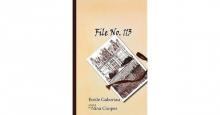 Le dossier no. 113. English
Le dossier no. 113. English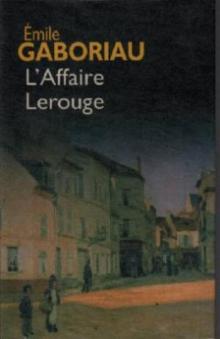 L'affaire Lerouge. English
L'affaire Lerouge. English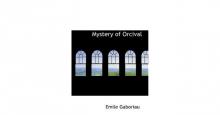 Le crime d'Orcival. English
Le crime d'Orcival. English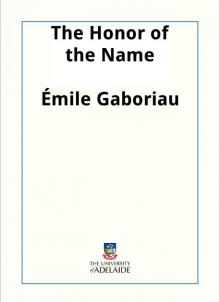 The Honor of the Name
The Honor of the Name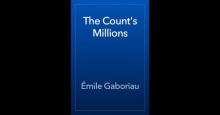 The Count's Millions
The Count's Millions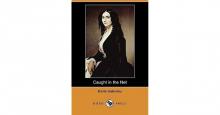 Caught in the Net
Caught in the Net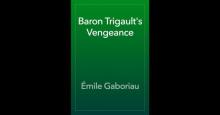 Baron Trigault's Vengeance
Baron Trigault's Vengeance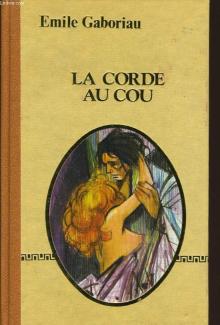 La clique dorée. English
La clique dorée. English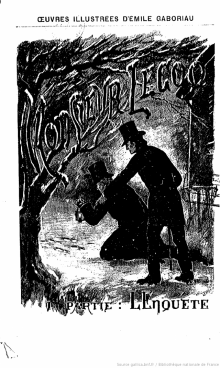 Monsieur Lecoq, v. 1
Monsieur Lecoq, v. 1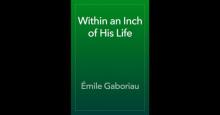 Within an Inch of His Life
Within an Inch of His Life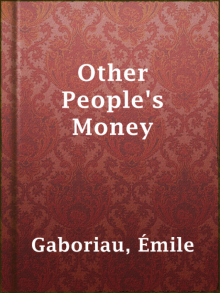 Other People's Money
Other People's Money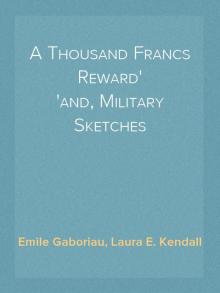 A Thousand Francs Reward; and, Military Sketches
A Thousand Francs Reward; and, Military Sketches